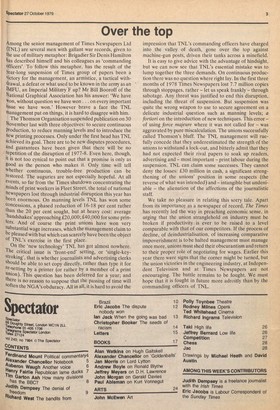Over the top
Among the senior management of Times Newspapers Ltd (TNL) are several men with gallant war records, given to the use of military metaphor: Brigadier Sir Denis Hamilton has described himself and his colleagues as 'commanding Officers'. To follow this metaphor, has the result .of the Year-long suspension of Times group of papers been a victory for the management, an armistice, a tactical withdrawal, a defeat or what used to be known in the army as an NIFU, an Imperial Military -F up? Mr Bill Booroff of the National Graphical Association has his answer: 'We have won, without question we have won. . . on every important Issue we have won.' However brave a face the TNL management put on things, it is hard to disagree with him.
The Thomson Organisation suspended publication on 30 November last with three objectives: to secure continuous Production, to reduce manning levels and to introduce the new printing processes. Only under the first head has TNL achieved its goal. There are to be new disputes procedures, and guarantees have been given that there will be no repetition of the disruption of 1977-8. Even here, though, It is not too cynical to point out that a promise is only as good as the person who makes it. Only time will tell Whether continuous, trouble-free production can be restored. The auguries are not especially hopeful. At all events, so far from the Times shutdown concentrating the minds of print workers in Fleet Street, the total of national newspapers lost through industrial disruption this year has been enormous. On manning levels TNL has won some Concessions, a phased reduction of 16-18 per cent rather than the 20 per cent sought, but at heavy cost: average handshakes' approaching £20,000; £40,000 for some printers. And of course the print unions have won very substantial wage increases, which the management claim to be pleased with but which can scarcely have been the object Of TNL's exercise in the first place. On the 'new technology' TNL has got almost nowhere. The critical issue is 'front-end' setting, or 'single-keystroking', that is whether journalists and advertising clerks Should be able to set copy directly, rather than type it for re-setting by a printer (or rather by a member of a print union). This question has been deferred for a year; and there is no reason to suppose that the passing of time will soften the NG A's obduracy. All in all, it is hard to avoid the impression that TNL's commanding officers have charged into the valley of death, gone over the top against machine-gun posts, driven their tanks across a minefield.
It is easy to give advice with the advantage of hindsight, but we can now see that TNL's essential mistake was to lump together the three demands. On continuous production there was no question where right lay. In the first three months of 1978 Times Newspapers lost 7.7 million copies through stoppages, rather — let us speak frankly — through sabotage. Any threat was justified to end this disruption, including the threat of suspension. But suspension was quite the wrong weapon to use to secure agreement on a delicate industrial question such as manning levels; a fortiori on the introduction of new techniques. This error — of using force rnajeure where it was not called for — was aggravated by pure miscalculation. The unions successfully called Thomson's bluff. The TNL management will ruefully concede that they underestimated the strength of the unions to withstand a lock-out, and bitterly admit that they had not expected their rival papers to soak up readers, advertising and — most important — print labour during the suspension. TNL can claim some successes. They cannot deny the losses: £30 million in cash, a significant strengthening of the unions' position in some respects (the reverse of what was intended) and — intangible but undeniable — the alienation of the affections of the journalistic staff.
We take no pleasure in relating this sorry tale. Apart from its importance as a newspaper of record, The Times has recently led the way in preaching economic sense, in urging that the union stranglehold on industry must be broken if productivity is ever to be raised to a level comparable with that of our competitors. If the process of decline, of deindustrialisation, of increasing comparative impoverishment is to be halted management must manage once more, unions must shed their obscurantism and return to their proper role of negotiating for wages. Earlier this year there were signs that the corner might be turned, but the union victories in the engineering industry, at Independent Television and at Times Newspapers are not encouraging. The battle remains to be fought. We must hope that it is fought in future more adroitly than by the commanding officers of TNL.


































 Previous page
Previous page